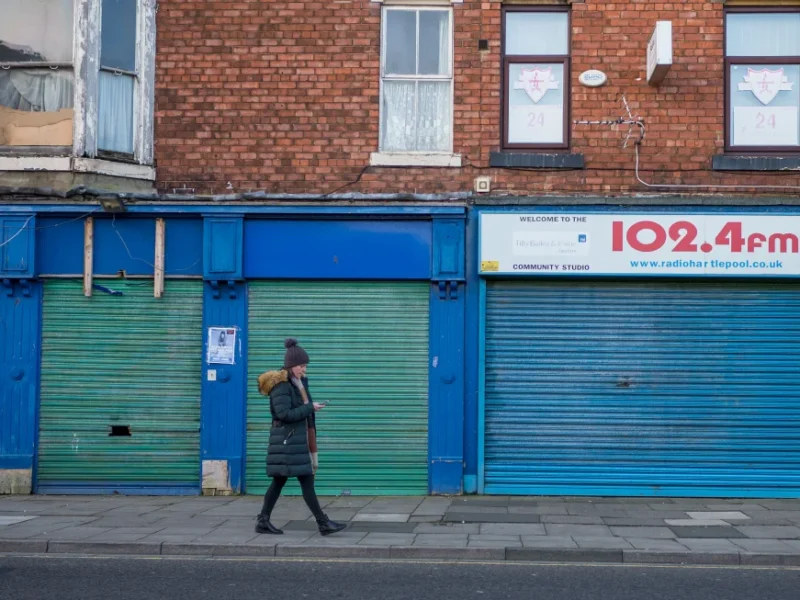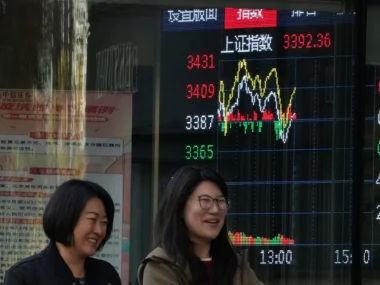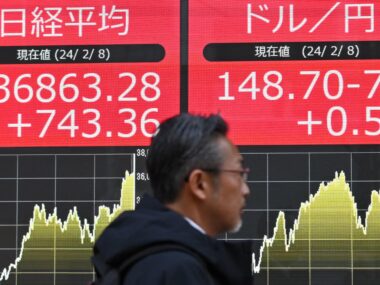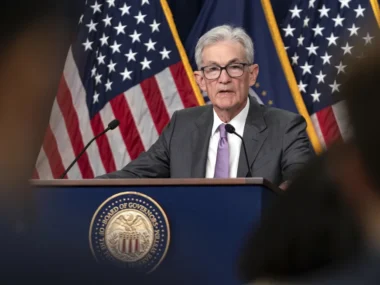The United Kingdom has officially entered a recession just months before a general election, according to official figures released Thursday, undermining Prime Minister Rishi Sunak’s promise to foster economic growth.
The Office for National Statistics reported a 0.3% decline in Gross Domestic Product (GDP) in the final quarter of 2023, following a 0.1% contraction in the July-to-September period. A recession is typically defined as two consecutive quarters of economic contraction.
Liz McKeown, director of economic statistics at the ONS, stated, “All the main sectors saw declines during the quarter, with manufacturing, construction, and wholesale trade being the most significant contributors to the downturn, partially offset by increases in the accommodation and rental of vehicles and machinery.”
The ONS estimates that UK GDP grew by a modest 0.1% in 2023, marking the weakest performance since 2009, excluding 2020, which was heavily impacted by the pandemic. This year’s minimal growth follows a 4.3% expansion in 2022.
McKeown added, “Throughout 2023, the economy has largely stagnated.”
This news will likely disappoint Sunak, particularly as his ruling Conservative Party is facing two local elections in England. It could also further bolster the already significant lead held by the opposition Labour Party in opinion polls ahead of the anticipated national election this year.
Suren Thiru, director of economics at the Institute of Chartered Accountants in England and Wales, commented, “Although the shallow nature of this recession provides some comfort, these figures also confirm that our economy remained trapped in a cycle of persistent stagnation throughout 2023.”
The data also presents an unwelcome backdrop for the government’s upcoming annual budget announcement next month. UK finance minister Jeremy Hunt is expected to introduce moderate tax cuts despite the sluggish economy and soaring government debt levels.
Hunt acknowledged Thursday that low growth was anticipated due to the Bank of England’s decision to raise interest rates to levels not seen in 26 years to combat inflation. However, he expressed optimism, stating, “But there are signs that the British economy is turning a corner… Although many families are still facing tough times, we must adhere to the plan of reducing taxes on work and businesses to build a stronger economy.”
Some might consider labeling the situation as a recession overly dramatic.
Despite the mild recession, the UK economy has performed much better than anticipated by many economists a year ago, when forecasts predicted a more severe downturn.
Samuel Tombs, chief UK economist at Pantheon Macroeconomics, believes that labeling the decline in economic activity in the second half of 2023 as a recession is overly dramatic. He points out that employment continued to rise, real wages rebounded, and measures of business and consumer confidence returned to levels indicative of increasing activity by the end of the year. Additionally, slowing inflation and anticipated interest rate cuts later in the year could further stimulate economic activity, particularly in the dominant services sector.
In January, annual UK inflation remained unchanged at 4%, still double the Bank of England’s 2% target but considerably lower than the record high of 11.1% reached in October 2022. Food inflation also decreased to 7% from a recent peak of 19.2% in March 2023, according to the Office for National Statistics (ONS). Moreover, food prices experienced their first decline in over two years compared to the previous month.
Meanwhile, salaries have consistently outpaced prices for seven consecutive months. Average wages, excluding bonuses, grew at an annual rate of 6.2% in the three months to December, as reported by the ONS.
Nomura economists expressed their belief that the UK recession is likely coming to an end, anticipating slow but positive growth in the near future.
However, separate data from the ONS revealed that productivity growth, measured as output per hour, remained stagnant throughout last year, indicating potential challenges for the recovery.
This story has been updated with additional details.











